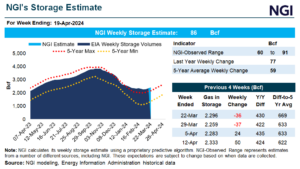Infrastructure | International | NGI All News Access | Oil
Trans Mountain Expansion Reaches Halfway Mark
© 2024 Natural Gas Intelligence. All rights reserved.
ISSN © 2577-9877 | ISSN © 2158-8023 |

Markets
More operational wobbles at the Freeport LNG terminal and worries of an expected bearish government storage print Thursday triggered another bout of selling in natural gas futures Wednesday. At A Glance: Freeport LNG Train 3 trips EQT sees curtailments through May Analysts expect above-average build The May Nymex contract dove around 10.0 cents in the…
April 24, 2024Infrastructure
Energy Transition
By submitting my information, I agree to the Privacy Policy, Terms of Service and to receive offers and promotions from NGI.